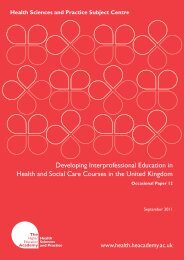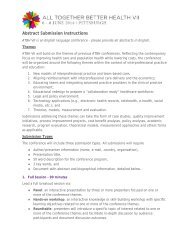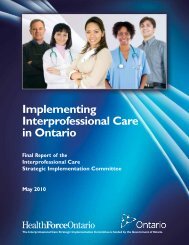Health and Social Care Policy and the Interprofessional ... - CAIPE
Health and Social Care Policy and the Interprofessional ... - CAIPE
Health and Social Care Policy and the Interprofessional ... - CAIPE
You also want an ePaper? Increase the reach of your titles
YUMPU automatically turns print PDFs into web optimized ePapers that Google loves.
<strong>Health</strong> Impact Assessment<br />
A WHO consensus paper defined <strong>Health</strong> Impact Assessment (HIA) as ‘a<br />
combination of procedures, methods, <strong>and</strong> tools by which a policy, programme<br />
or plan may be judged as to its potential effects on <strong>the</strong> health of <strong>the</strong><br />
population <strong>and</strong> <strong>the</strong> distribution of those effects within <strong>the</strong> population’ WHO<br />
1999 (Go<strong>the</strong>nburg consensus paper, European Centre for <strong>Health</strong> <strong>Policy</strong>).<br />
HIA is a systematic assessment of <strong>the</strong> interrelated personal, social, cultural,<br />
economic, <strong>and</strong> environmental factors that influence both individual <strong>and</strong><br />
population health status. Categories, known as determinants of health, are<br />
measured against policy changes, thus offering <strong>the</strong> best opportunity for<br />
improving <strong>the</strong> health of a population on an inter-sectoral basis. The ECHP is<br />
beginning to use HIA as an integral part of its public health programme <strong>and</strong><br />
have developed a toolkit that could be used to assess <strong>the</strong> possible health<br />
impacts of policies <strong>and</strong> proposals (see ECHP, 2001).<br />
Unlike <strong>the</strong> Environmental Impact Assessment (EIA), where legal statutes<br />
exist, HIA is not currently a m<strong>and</strong>atory requirement. However statutory<br />
requirements for employment, housing <strong>and</strong> transport, <strong>and</strong> <strong>the</strong>ir cost<br />
implications are being used increasingly in <strong>the</strong> overall HIA. Experts warn<br />
however that HIA should be viewed only as one, ra<strong>the</strong>r than <strong>the</strong>, way of<br />
embedding public health in policy development (Breeze & Hall 2001, Letho &<br />
Ritsatakis 2001, Hubel & Hedin 2003).<br />
In 2003 a survey of <strong>the</strong> HIA <strong>and</strong> government policy making in European<br />
countries was coordinated by <strong>the</strong> Welsh Assembly Government (Wales, UK)<br />
& <strong>the</strong> European Network of <strong>Health</strong> Promotion Agencies, Brussels in cooperation<br />
with <strong>the</strong> European Commission, DG <strong>Health</strong> & Consumer Protection<br />
Public <strong>Health</strong> <strong>Policy</strong> Unit (Luxembourg) <strong>and</strong> <strong>the</strong> World <strong>Health</strong> Organisation<br />
(WAG, 2003). Of <strong>the</strong> 22 European countries that took part, all but one<br />
admitted that health was a relevant <strong>the</strong>me across policies <strong>and</strong> programmes<br />
developed in o<strong>the</strong>r policy areas. However, even though seven governments<br />
appeared to be using HIA, <strong>the</strong> findings suggest that its use 'appears to be<br />
driven by opportunism as opposed to a systematic approach' (p4). Its use also<br />
varies across policy areas <strong>and</strong> reported as 'good in some policy areas but<br />
poor in o<strong>the</strong>rs' (p4). The report concluded that, although some governments<br />
have allocated some resources to support <strong>the</strong> development <strong>and</strong> use of HIA,<br />
<strong>the</strong>re is a need to increase awareness <strong>and</strong> underst<strong>and</strong>ing of its role within <strong>and</strong><br />
between countries. It is this that ultimately will ensure integrated <strong>and</strong> intersectoral<br />
policy <strong>and</strong> activity, which focus on <strong>the</strong> determinants of health.<br />
According to Wismar (2004), sceptics question <strong>the</strong> effectiveness of HIA<br />
because of <strong>the</strong> inherent difficulties of evaluating its effect on <strong>the</strong> health of <strong>the</strong><br />
nation. Indeed Wismar suggests that an evaluation would need to span a<br />
decade or more to ga<strong>the</strong>r useful information. Definitive answers however, are<br />
needed before that. Quigley &Taylor (2003) suggest that <strong>the</strong> effectiveness of<br />
HIA could be assessed by measuring its influence on <strong>the</strong> decision-making<br />
processes when writing policy.<br />
24













